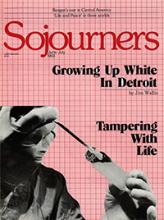No European church statement on nuclear arms has created controversy more quickly than the June, 1982 declaration of the West German Reformed Alliance. The debate's intensity was sparked by the statement's use of the European tradition of status confessionis. This means that there come times in the church when Christians have to offer a confession.
Originating in the Reformation of the 16th century in regard to doctrinal issues, the notion that an issue has reached the status of confession is intended to force a distinction between teachings still Christian and teachings that must be considered un-Christian and sinful. Dietrich Bonhoeffer and the Confessing Church used the idea to take a stand against Nazi teachings infiltrating the churches in the 1930s. In its 1934 Barmen Declaration, the Confessing Church employed status confessionis to reject any loyalty to the ideology of National Socialism.
Today we often hear that Russia is using Europe as a pawn in the propaganda war surrounding, for example, the Geneva arms reduction talks. The European peace movement is often called communist-inspired. But in order to understand the resistance in the churches, one has to go at least back to the 1950s when nuclear weapons were first placed on European soil and the church protest began. Much of it, even then, was rooted in the status confessionis argument of the Nazi era.
The June, 1982 Reformed Alliance statement has to be read against this background. At its core it offers an either/or on the European scene. The Reformed Alliance position argues in effect that you cannot be a Christian and support nuclear arms.
Read the Full Article

